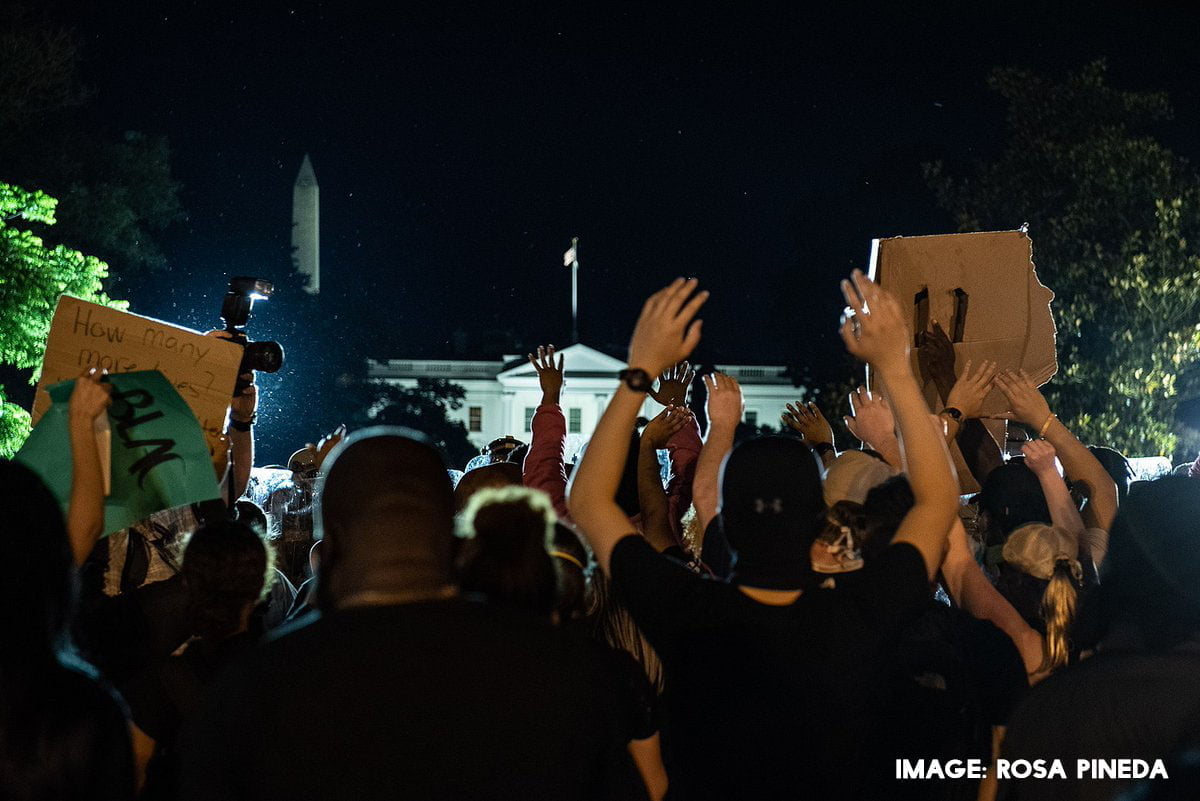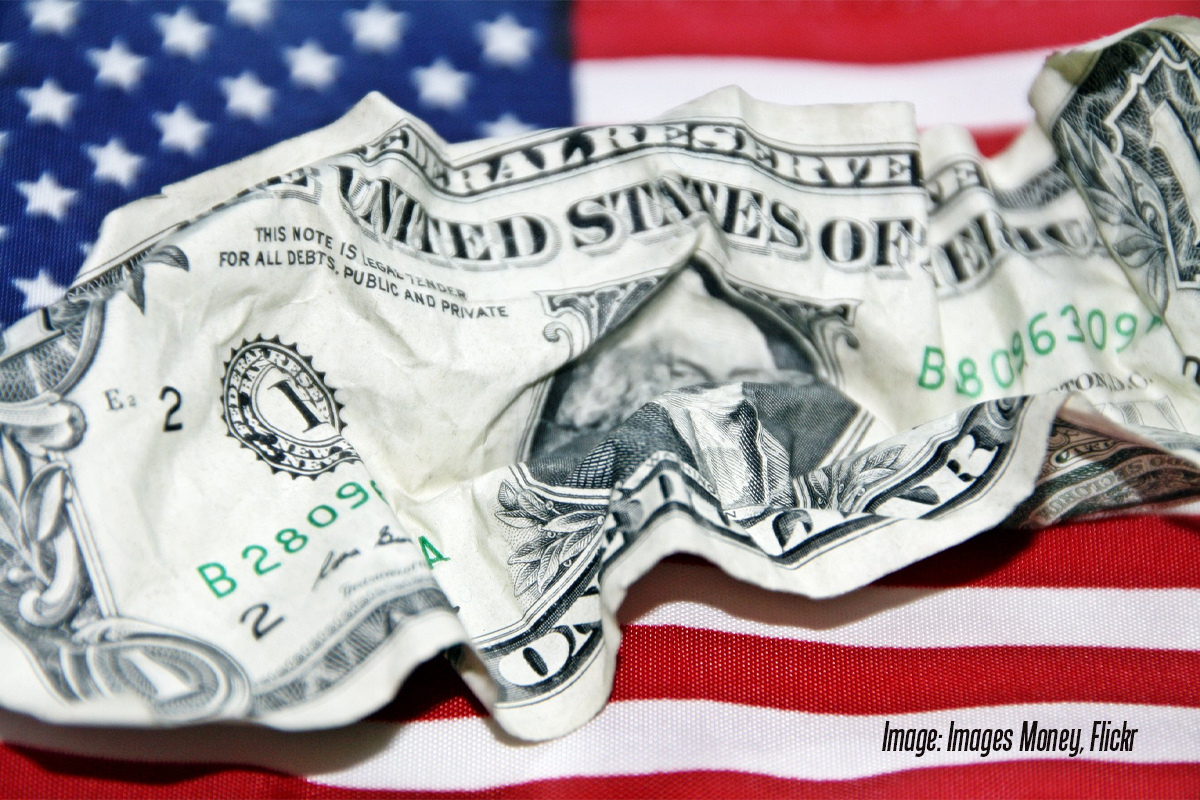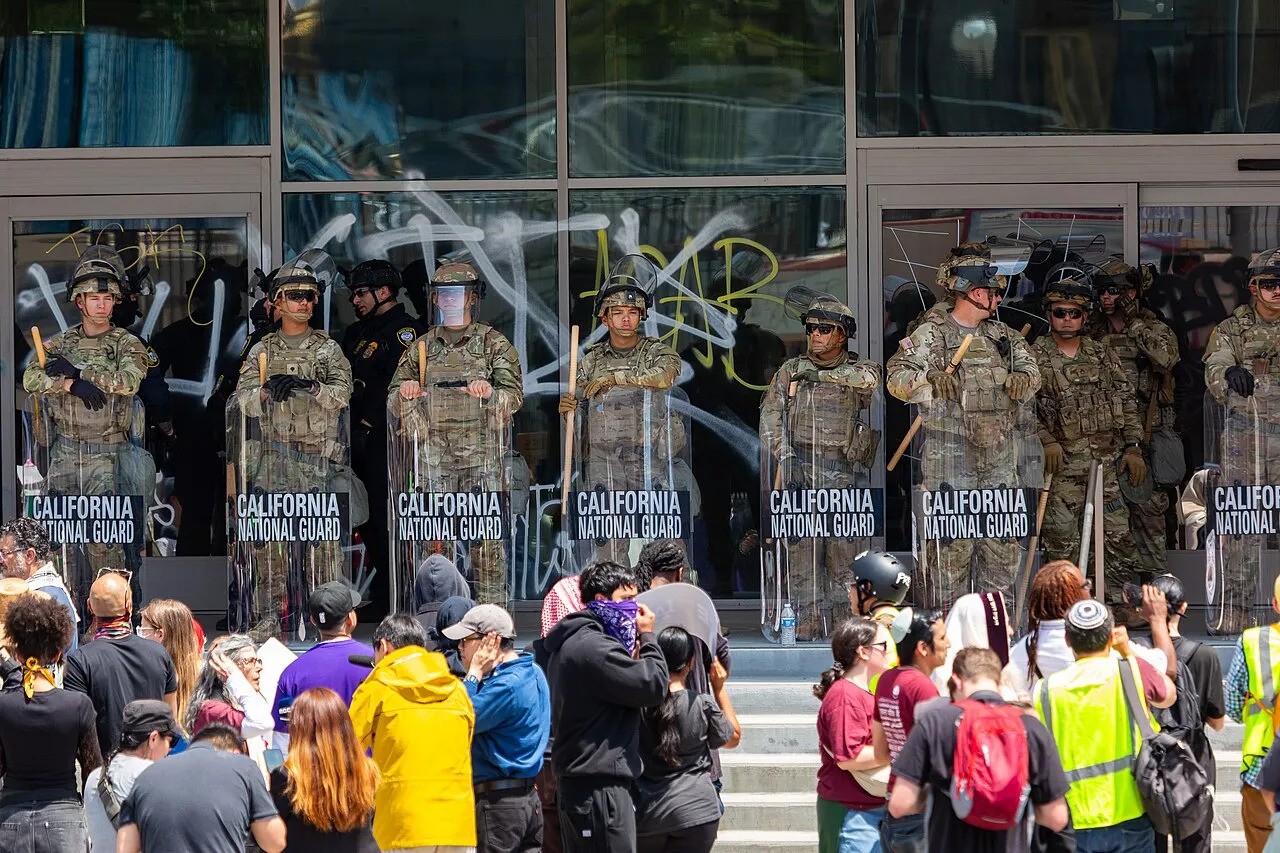Alan Woods comments on the uprising in the USA, which was sparked by the police murder of George Floyd, and has become the catalyst for an explosion of anger by the downtrodden in America. What is the way forward?
“For they have sown the wind, and they shall reap the whirlwind.” (Hosea, 8:7)
Dramatic scenes from the USA have shocked public opinion and reverberated all over the world. In the streets of many American cities, huge numbers of workers and youth have moved into action. A mood of burning, uncontrollable anger has taken hold of the people.
The immediate cause of this eruption was the murder in Minneapolis on 25 May of George Floyd – one helpless, frightened, unarmed man lying on the ground, begging for his life, as a police officer knelt on his neck, slowly and deliberately crushing his windpipe.
One can only imagine the torment of physical and mental agony suffered by the victim as slowly, inexorably, the life was throttled out of him. “I can’t breathe, officer. I can’t breathe. I’m dying.” But his urgent pleading fell on deaf ears. The police officer continued to press on his throat. His terror and agony went on for just about eight minutes. Then he stopped pleading – forever.
These criminals in police uniform then duly filled in a report that presented this atrocity in an entirely false light. Unfortunately for them, the whole gruesome incident was recorded on a witnesses’ phone. Millions the world over saw the horrific images. And so the people of the USA, as well as the entire world, could see what was happening.
The tipping point
This is far from being an isolated incident. In the USA, the police killed 1,099 people in 2019. There were only 27 days where police did not kill someone last year.
The overwhelming majority of the victims of police violence are poor people, unemployed people, members of the so-called underclass, and a high proportion of them were, of course, people of colour.
Black people made up 24 percent of those killed, despite being only 13 percent of the population. And the worst thing of all is the complete impunity with which the police operate. 99 percent of killings by police from 2013-2019 have not resulted in officers being charged with a crime.
It is in this context that we must see the present mass uprising – for that is what it is. The murder of George Floyd was the straw that broke the camel’s back. It lit a fuse that sparked off a wave of angry demonstrations all over the country.
The accumulated anger of lower-class Americans, ordinarily oppressed Americans, particularly oppressed national and ethnic minorities, spilled onto the streets; despite the fact that America, like other countries, is in a state of lockdown because of the coronavirus pandemic.
The pandemic has already cost the lives of over 100,000 Americans. A further 42 million are unemployed, as the US economy faces meltdown. And not far beneath the surface of society, there is a seething anger that resembles the searing mass of molten rock that forces its way to the surface of the earth in a volcanic eruption.
Thousands upon thousands of people poured onto the streets to express their rage and indignation at the monstrous injustices people have had to suffer silently for generations.
Authorities taken off balance
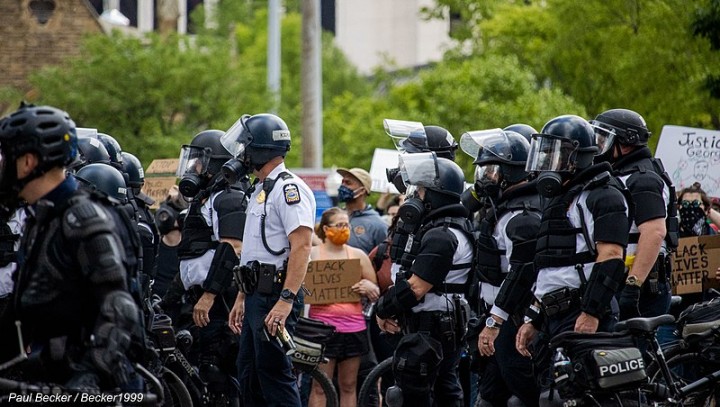 The events that followed were quite unprecedented. In Minneapolis, the police were forced to flee in the face of the fury of the protests. The demonstrators gained control of the Third Police Precinct and set it ablaze.
The events that followed were quite unprecedented. In Minneapolis, the police were forced to flee in the face of the fury of the protests. The demonstrators gained control of the Third Police Precinct and set it ablaze.
This must have shaken the authorities, who were clearly unprepared for this enormous outburst of indignation and anger. Alarmed by the ferocity of the movement, the authorities reacted in Minnesota by announcing the sacking of the murderers, then, belatedly, they bowed to pressure and charged officer Derek Chauvin with second-degree murder, and the other cops will also be charged with aiding and abetting.
But it was a case of too little and too late. The movement has gone far beyond the initial cause. It has broadened into a protest, not just against racism and police violence, but against gross social inequalities, which have been exacerbated thousandfold by the present health and economic emergencies.
One young black woman said: “We have put up with this for 400 years. Enough is enough.” Another man summed up the mood. When asked why he was demonstrating, he answered with one word: “injustice”.
The movement spreads
Practically overnight, on the evening of 29 May, the USA was plunged into chaos. This was unlike anything that had been seen in the US – ever. Most of the people out on the streets were protesting peacefully, but they were met with rubber bullets, tear gas and with savage beatings. They were batoned, beaten to the ground, shot at; and in some cases, killed.
The authorities imposed a curfew in over 40 cities. But this has been widely defied by the protesters, who fought back, leading to clashes with the police. In Colorado, shots were fired near the statehouse. At a protest in Louisville, seven people were shot. But nothing succeeded in stemming the mighty flood of protest.
As if somehow moved by an unseen hand, the protests spread like wildfire right across the country. Demonstrators immediately took to the streets in places like New York, Atlanta, Columbus, Los Angeles, Phoenix, Denver and Washington and elsewhere.
This was an entirely spontaneous combustion of mass anger. It did not require any organisation or plan. It was an elemental upsurge of popular discontent that seemed to emerge from nowhere, and which swept everything before it.
The sheer scale of the movement took everyone by surprise, including many political activists. They have continued unabated for their eighth night, despite ferocious repression from the forces of “law and order”.
The question of violence
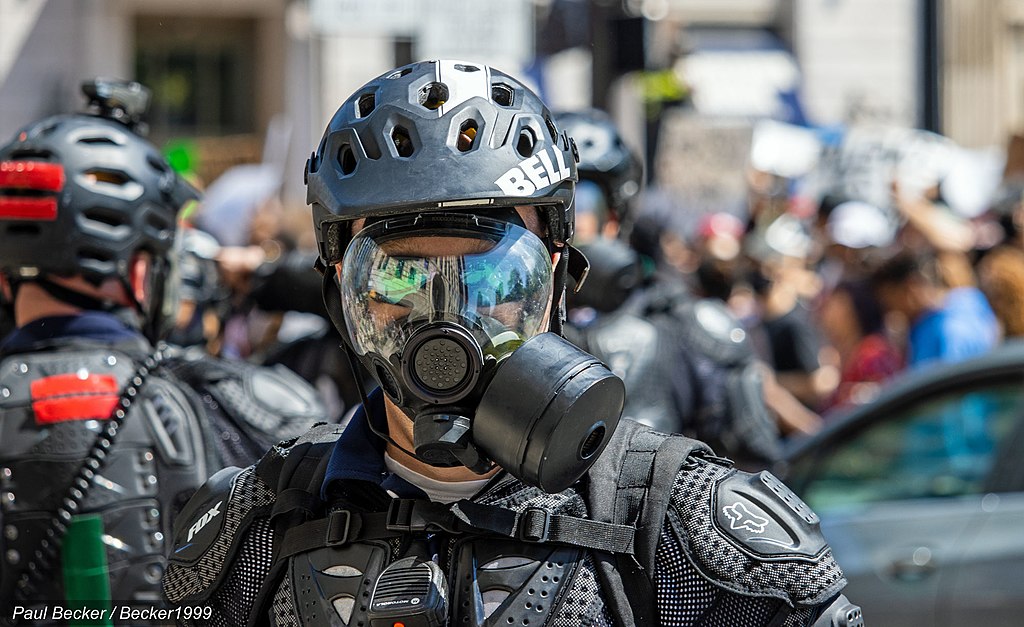 The yellow press has accused the protesters of violence. But the state itself is nothing else but organised violence. The root cause of the present upheaval is the murderous violence of the men dressed in blue. What the ruling class objects to is not violence per se, but only when the masses meet the organised violence of the state with a violent response of their own.
The yellow press has accused the protesters of violence. But the state itself is nothing else but organised violence. The root cause of the present upheaval is the murderous violence of the men dressed in blue. What the ruling class objects to is not violence per se, but only when the masses meet the organised violence of the state with a violent response of their own.
Only the state is entitled to commit murder, and those who murder while wearing police uniforms are not arrested, imprisoned, punished or even condemned. More often, they are praised and decorated for their service to the state.
Who is really behind the violence that sometimes erupts at the end of demonstrations? In every protest of this kind, there is always a fringe of the de-classed elements, lumpenproletarians and actual criminals who take advantage of the disorder to loot and commit arson.
The genuine protesters have attempted to keep these in check, recognising that they are alien elements who only serve to provide excuses for the police to react with even more violence.
But there may be more sinister elements involved. There is plenty of evidence to suggest that agent provocateurs have been active during the present protests, fomenting violent clashes and disorder in order to cause chaos and disrupt the movement.
Trump incites to murder
During a press conference on 29 May (really just a statement, with no questions asked or answered), Trump had nothing to say about the wave of protests that are shaking American society to the roots.
The assembled ladies and gentlemen of the press waited impatiently for some kind of statement on the news of the day. Instead, the president spoke about breaking off relations with the World Health Organisation, he attacked China, but made no mention of the fact that American cities were in flames.
As the president proceeded to abandon the rostrum, frustrated journalists attempted to shout their questions, but he swiftly completed his balancing act, leaving the assembled press men and women frustrated and angry. Not a single one of them believed his protests.
The Emperor Nero is said to have played his lyre while Rome burned. America, like Rome in Nero’s time, is burning. And the Emperor Trump, who, unlike Nero, shows no aptitude for music whatsoever, cheerfully pours petrol on the flames.
President Trump, who entertains a similar dream of Imperial greatness, remained safely ensconced in the White House, from where he took to Twitter, calling protesters “THUGS” and warning, “when the looting starts, the shooting starts.”
That was too much even for Twitter, which interpreted Trump’s statement as an open incitement to murder, which it undoubtedly was. A little later, he made an unconvincing attempt to deny that this was the case.
Trump later said that he did not mean that the troops and police should actually open fire. He meant something entirely different, although what that thing was is utterly obscure. But nobody can be in any doubt that the president meant just what he said.
He has warned that “vicious dogs, and most ominous weapons” will be turned against protesters outside the White House, and of unleashing “the unlimited power of our military”.
It has emerged that he deliberately provoked a violent attack against the protesters outside the White House, in order to clear his way to go to a nearby church, where he stood with the Bible in his hand for the benefit of the press photographers, before going away, without saying any prayers, as far as we know.
This act was supposed to indicate the President’s great personal courage, in addition to his undoubted attachment to the spirit of Christian charity. But it did not require much courage when he was surrounded by heavily armed National Guards and a small army of security men.
A bully in a bunker
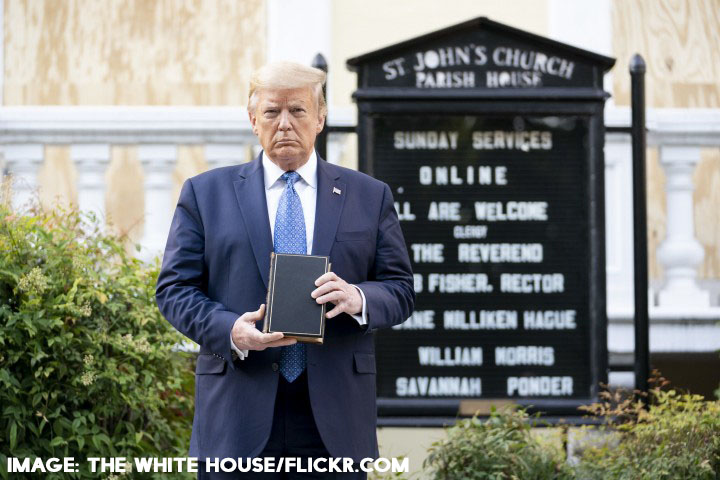 The real extent of Trump’s courage was glaringly revealed by more recent events. The fires of revolt reached the door of the White House on, where the peoples’ angry chants reached the ears of the president, who was hastily bundled into an underground bunker, where he remained for a little under an hour before being brought upstairs.
The real extent of Trump’s courage was glaringly revealed by more recent events. The fires of revolt reached the door of the White House on, where the peoples’ angry chants reached the ears of the president, who was hastily bundled into an underground bunker, where he remained for a little under an hour before being brought upstairs.
An inside source told CNN that “if the condition at the White House is elevated to RED and the President is moved” to the Emergency Operations Center “Melania Trump, Barron Trump and any other first family members would be moved as well.”
A law enforcement source and another source familiar with the matter told CNN that first lady Melania Trump and their son, Barron, were also taken to the bunker for fear the protesters would breach the compound. This is unprecedented in the US in modern, if any, times!
Donald J. Trump is neither more nor less than a schoolyard bully. And like all schoolyard bullies, he’s a coward at heart. His craven cowardice is what lies behind his brazen threats and senseless bragging.
The image of the President of the USA – the most powerful man in the world – cowering in a bunker to escape from what was really a relatively small number of demonstrators tells us all we need to know about the moral fibre of Donald J. Trump. And his messages reflected fear and panic. Even the mayor of Washington accused him of inciting violence.
When the people lose their fear of the state, the last defences of the existing order begin to crumble. That is what has terrified the American ruling class. That explains the hasty decision to put the murderers on trial.
“Send in the troops”
It seems that sections of the Republican leadership are now so rattled by this turn of events that they would like the president to make a statement to calm things down. But then they are stuck with the contradiction that anything this president now says is likely to add even more fuel to the fire.
The Trump administration has already put an active duty military police battalion on a shorter response time in and around Washington on Monday.
Defence Secretary Mark Esper, taking part in the call Trump held with governors on Monday, said there are now more than 17,000 National Guard in 29 states and the District of Columbia, surpassing the 15,000 called up for Hurricane Katrina in 2005. Another 45,000 are supporting efforts to fight the coronavirus pandemic.
For any normal person, these forces would be more than sufficient to deal with any civil disorder. But as we know, Donald J. Trump is not a normal person.
On Monday 1 June, Trump stepped up his hysterical rhetoric, threatening to use military forces to “dominate” the protesters. During a call with governors he urged a tougher response. He said he wished they “had an occupying force”.
In the Rose Garden, as loud bangs were heard and demonstrators ran screaming, Trump said he was taking “swift and decisive action” to protect Washington by dispatching “thousands and thousands of heavily armed soldiers, military personnel, and law enforcement officers to stop the rioting, looting, vandalism, assaults, and the wanton destruction of property.”
“We’re going to clamp down very, very strong,” Trump said. “The word is ‘dominate.’ If you don’t dominate your city and your state, they’re gonna walk away with you. And we’re doing it in Washington, in DC, we’re going to do something that people haven’t seen before… But we’re going to have total domination.”
He also said that he had “strongly recommended to every governor to deploy the National Guard in sufficient numbers that we dominate the streets.” If cities or states fail to act, Trump said, “then I will deploy the United States military and quickly solve the problem for them.”
Later, as if to grant the president his wish, the National Guard fired tear gas and rubber bullets at a peaceful crowd outside the White House. But the National Guard is not the army. It is composed of former service people who hold civilian jobs and train part-time. They are usually deployed in their home states by governors or the federal government who decide the length of each mission. They can perform law enforcement actions when under the command of state governors. But the active military is forbidden by law from doing so unless the President invokes the Insurrection Act: an 1807 law that allows a president to deploy the US military to suppress civil disorder.
That appears to be the next Great Idea that is beginning to form in the swarming mists of Trump’s addled brain. Anxious to convince America of his manhood and to dispel the image of a great yellow streak running down his back that persists in the public’s mind ever since the episode of the bunker, he is hellbent on calling in the military to his aid.
However, this is easier said than done.
Wait for elections?
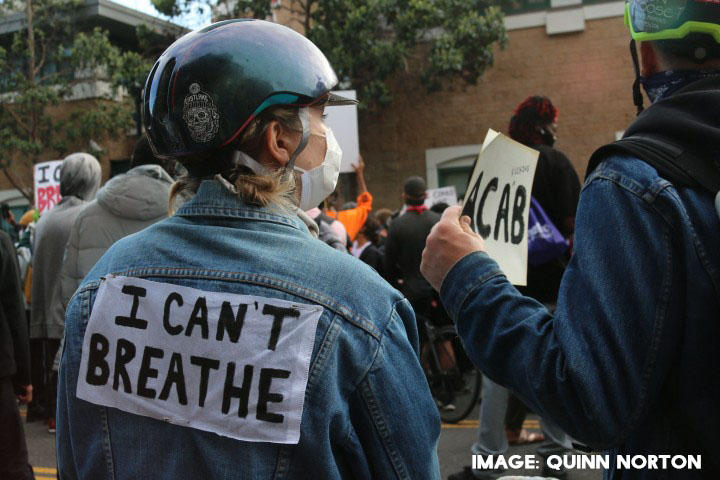 Former vice president Joe Biden, the presumptive Democratic presidential nominee, said in a video address that this was “no time to encourage violence.” He said he had spoken with Floyd’s family and called on Americans to confront the nation’s history of racial injustice.
Former vice president Joe Biden, the presumptive Democratic presidential nominee, said in a video address that this was “no time to encourage violence.” He said he had spoken with Floyd’s family and called on Americans to confront the nation’s history of racial injustice.
Fine words! But as the proverb goes: fine words butter no parsnips. Biden calls for calm, peace and harmony. All Americans should come together and love each other. Then all would be solved. The lamb should lay down with the wolf, et cetera et cetera.
Sadly, the appeals for peace are met with baton charges, tear gas, rubber bullets and hot lead. Biden’s empty rhetoric reminds us of another biblical phrase: “They have healed also the hurt of the daughter of my people slightly, saying, Peace, peace; when there is no peace.” (Jeremiah 6:14).
They want protesters to act in a law-abiding way. The fact is that the law is made by the ruling class to defend its interests, not those of the majority. Solon of Athens said that the law is like a spider’s web: the small are caught, and the great tear it up. That was true then, and it is still true now.
It is all very well to preach patience and tolerance and peace, But the patience of the people has definite limits. And now it has been reached.
Wait for the elections, the Democrats say. But the masses have waited for elections for many years, and receive nothing except empty promises that are systematically violated by both the main parties.
And nothing ever changes.
Democrats and Republicans represent exactly the same class interests. The only difference is in the methods they choose to perpetuate the rule of a tiny, unrepresentative clique of bankers and fat cats. Both the open reactionaries and hypocritical false friends. In the last analysis, the latter are more dangerous than the former. At least with Trump, you know where you are.
Trump says: get off the streets and go home, we will shoot you. The Democrats say: get off the streets and go home, be patient, and wait for the elections. Both agree on one thing: get off the streets!
Once the masses are demobilised and atomised in their houses, they are reduced to a state of impotent rage. The time has come to sweep aside both wings of the ruling class. That is the only way to defeat the present evil and unjust system, to put it down once and for all, to destroy it from top to bottom and replace it with a new and better world.
A valuable lesson
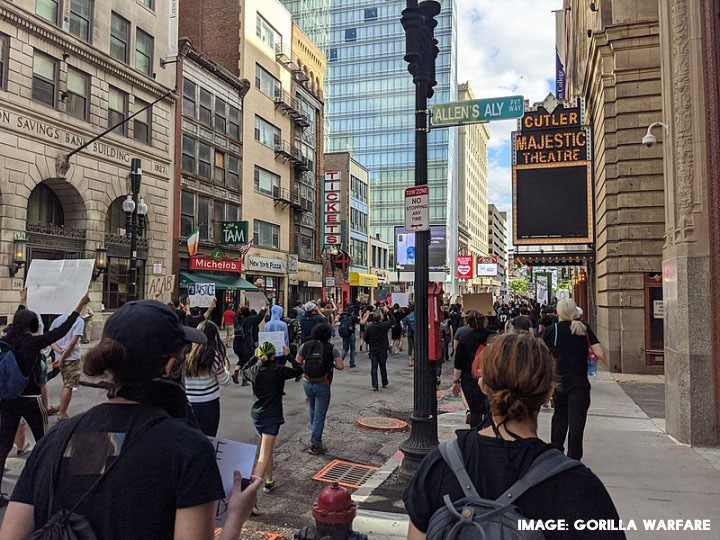 There is naturally a burning hatred towards Donald Trump, who in his person sums up all the cruelty, viciousness, greed and arrogance of the ruling class as a whole. And yet we should thank President Trump for one thing. He has provided the masses with a most valuable lesson.
There is naturally a burning hatred towards Donald Trump, who in his person sums up all the cruelty, viciousness, greed and arrogance of the ruling class as a whole. And yet we should thank President Trump for one thing. He has provided the masses with a most valuable lesson.
There are two ways in which people can be educated about the nature of the state. Firstly, they can read books and listen to Marxist lectures. But this reaches only a tiny minority of society.
Secondly, they can learn a more painful, but highly effective lesson when they’re beaten on the head with a police truncheon, tear gassed and shot at. Lessons such as these are not easily forgotten by those who have experienced them.
The aim of this pitiless violence is to cow the people and make them afraid. Normally this tactic works very effectively. But there are limits to all things. The use of violence is subject to the law of diminishing returns.
Splits at the top
Trump’s meeting with state governors on Monday appears to have the opposite effect to what he intended. A Virginia government official said: “The call with governors made it clear that the President was interested in escalating the situation and the governor did not think that was responsible.” He added: “When it became clear that our troops would be under the command of the attorney general and not Mayor Bowser, we decided that it was not in our best interests to take part.”
There is an old saying: fools rush in where angels fear to tread. The danger of employing military personnel in US cities is very clear to the generals. CNN reported that they had learned from defence officials of “deep and growing discomfort among some in the Pentagon even before President Donald Trump announced Monday that he is ready to deploy the military to enforce order inside the United States.”
It went on:
“But some Pentagon officials are deeply wary, several defence officials tell CNN. They have tried to respond by making a strong case that the situation does not yet call for deploying active duty troops unless state governors make a clear argument such forces are needed.”
“There is an intense desire for local law enforcement to be in charge,” a defence official said, alluding to the laws that forbid the military from performing law enforcement roles inside the United States. “There is also discomfort with the civil order mission among some National Guard troops — more of whom are now mobilized inside the US than at any previous time in history.”
Already, on Sunday, Army Maj. Gen. Thomas Carden, the Adjutant General of the Georgia National Guard told reporters:
“I believe that we in America should not get used to or accept uniformed service members of any variety having to be put in a position where they are having to secure people inside the United States of America.”
He added that although “while we are glad to do it and honoured to do it, this is a sign of the times that we need to do better as a country.”
Carden described the mission of reinforcing local authority by saying that, “of all the things I’ve been asked to do in the last 34-plus years in uniform, this is on the bottom of my list.” Speaking of his experience in Georgia, he acknowledged that the circumstances “called for it,” and said that he believes the National Guard presence “had a significant deter and calming effect.”
This must be the first time since the Civil War that there has been an open split between leading elements in the US military and the White House. This must be an extremely alarming development from the standpoint of the ruling class. Lenin explained that the first condition for revolution is splits in the ruling class: that the dominant circles should be in crisis, and unable to rule in the accustomed way.
This definition exactly fits the present situation in the USA.
Conditions for revolution
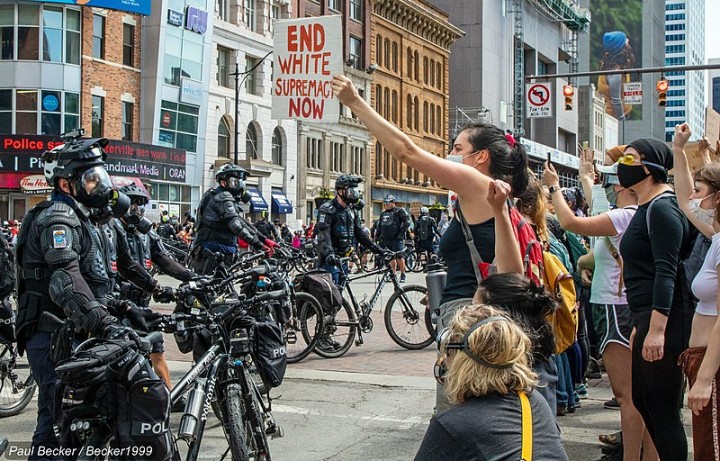 Is there a revolution in the USA? Clearly, this is not Russia in November 1917. The ruling class still has significant reserves of support, and the means to defend itself.
Is there a revolution in the USA? Clearly, this is not Russia in November 1917. The ruling class still has significant reserves of support, and the means to defend itself.
A crisis in the ruling class is only the first condition for revolution. But Lenin explained that other conditions were necessary, in order to bring it to fruition. Some of these conditions are undoubtedly present in the USA, but only in an incomplete and embryonic way. And not all of the necessary conditions are yet in existence, particularly the most important one.
What are the conditions for revolution? First, as we have said, the ruling class must be split and in crisis. That is certainly the case in the United States as I write. Second, the masses should be aroused and willing to fight for revolution. This condition also applies very clearly to the present situation in America. Tens of thousands of people have come onto the streets, defying the authorities and braving the brutal repression meted out by the forces of order.
The capitalist state possesses colossal resources and means of repression, which they have now deployed massively to defeat the uprising. But they have failed. And the main weapon that the masses possess, apart from the overwhelming strength of numbers, is their willingness to die. When the masses lose their fear of the police and the National Guard, that is a mortal danger to the existing order.
The third condition
The third condition is that the middle-class must be vacillating between the working class and the bourgeoisie. Everything seems to indicate that there is a fundamental change of consciousness taking place in the USA, and that this process has been enormously sped up by recent events.
The murder of George Floyd has rocked the nation’s conscience. A new Morning Consult poll conducted Sunday and Monday said that 54 percent of US adults support the protests. That includes 69 percent of Democrats and 49 percent of independents, who backed the protests by a more than 2-to-1 margin.
Even more significant was the reaction of Republicans, with 39 percent in support and 38 percent opposing them. This is an extraordinary result! It indicates that deep splits are opening up in the ranks of Trump’s own party.
Get organised!
The conditions for revolution in America either exist, or else are rapidly coming into existence. But there is a problem. The present movement, with all its tremendous spirit, courage and determination, has all the strengths of an elemental, spontaneous revolutionary movement, but also all of its weaknesses.
The present movement was not called into being by any organisation or individual. It is purely spontaneous and unorganised. It lacks leadership, direction or a clear programme, strategy or coherent tactics. This is a fatal weakness.
The movement is confronted by an organised, disciplined, unified force. It will fight to the bitter end to defend the status quo and the interests of the ruling class. Faced with such a powerful enemy, an unorganised movement can continue for some time. But sooner or later, it will come up against its own, very real limitations.
There is a definite limit to how far a movement can go in pursuing the same tactics. Merely coming onto the streets and confronting the forces of order, day after day, can never present a real solution. That solution can only be the definitive conquest of power by the working people themselves. It can only be the complete dissolution of the existing state, and its replacement by the direct rule of the people themselves. But that requires something more than mass demonstrations and protests, no matter how courageous and stormy they may be.
Karl Marx pointed out long ago that the working class without organisation is only raw material for exploitation. The final condition for a successful revolution is the presence of a revolutionary party capable of providing correct leadership, guidance, perspectives and programme. The absence of such a leadership is precisely the Achilles’ heel of the present insurrection in the USA.
How many times can people be expected to go onto the streets to have their heads cracked by police batons, to be gassed, shot at, arrested or even killed, without achieving any tangible result? Eventually, the demonstrators will get tired, weary, dispirited and fall back into inactivity. The mass demonstrations will be reduced in size and degenerate into mere riots, which will then give the ruling class and its agents the opportunity to crack down with even greater violence. And reaction once again will be in the saddle.
Is this an inevitable result? No, it is not inevitable. But in order to avoid it, certain lessons must be learned. One young demonstrator shouted out: “we are in a war”. That is absolutely correct. But the war is composed of a series of battles.
The present insurrection is only the opening shots in this war. It is just one battle, which we would strive to win. It is a preparatory school in which the soldiers of the forthcoming war are being trained, steeled and prepared.
There will be many such battles in the future. Our task is to unite all forces of society: all the oppressed and exploited classes must come together in a mighty army.
What does it mean?
The present crisis is not something of secondary importance, an outburst of madness that will soon pass without leaving a trace on America’s political and social life. In fact, it revealed very graphically the fractured nature of American society, the glaring differences between rich and poor, black and white, government and governed. In the words of the Washington Post:
“America’s persistent political dysfunction and racial inequality were laid bare this week, as the coronavirus death toll hit a tragic new milestone and as the country was served yet another reminder of how black people are killed by law enforcement in disproportionately high numbers. Together, the events present a grim tableau of a nation in crisis — one seared by violence against its citizens, plagued by a deadly disease that remains uncontained and rattled by a devastating blow to its economy.”
Serious commentators have begun to grasp the seriousness of the situation and what it really signifies for the future of America. Douglas Brinkley, historian and Rice University professor, told the Washington Post: “The threads of our civic life could start unravelling, because everybody’s living in a tinderbox”.
Barbara Ransby, a political activist and historian at the University of Illinois, said:
“People are seething about all kinds of things, There are major turning points and ruptures in history… This is one of these moments, but we’ve not seen how it will fully play out.”
Eric Foner, a historian at Columbia University, said the past is filled with events whose outcomes have not been as sweeping as they seemed to portend. He pointed to examples as disparate as the European revolutions of 1848 — famously said to be the “turning point at which modern history failed to turn” — and Hurricane Katrina in 2005, which exposed lethal failures but did not cause political transformation.
“There seems to be a very powerful inertia pushing us back to normal,” Foner said. “I’m skeptical of those who think this coronavirus is going to change everything.”
No way back
 These events show one thing very clearly: that something is changing in America. No, something has changed in America. The genie is out of the bottle, and will not be easily put back in again.
These events show one thing very clearly: that something is changing in America. No, something has changed in America. The genie is out of the bottle, and will not be easily put back in again.
No matter what the outcome of the present situation will be, nothing will ever be the same again.
What we have seen during the last week in America is an elemental, spontaneous movement of the masses that has acquired insurrectionary characteristics. The masses in general do not learn from books, but only from their experience. During a revolution, that learning process is accelerated enormously. The masses learn more in 24 hours during stormy events, such as those taking place in the USA, then in ten or 20 years of normal experience.
As that young protester pointed out, this is war: a pitiless war between hostile class forces. There can be no truce in this war, and in the end, the winner takes all.
The mass movement in America has caused waves internationally. There have been demonstrations in many cities in other countries including London, Manchester, Berlin, Stockholm, Austria, Amsterdam and so on. These protests are not just against racist murder in the USA. They reflect a general mood of anger and frustration at the existing order, which has become even more intolerable in the course of the coronavirus crisis and the lockdown.
The enemy that we face is very powerful. The bourgeois state is armed to the teeth. At first sight, our task seems to be impossible. But there is a power in society that is greater than that any state, army, police force or National Guard. That power is the power of the working class, once it is organised and mobilised to change society.
Remember: not a lightbulb shines, not a wheel turns and not a telephone rings without the permission of the working class. That is the power that is in our hands. We must make use of it to overthrow the dictatorship of big business, and put an end to oppression and suffering.
In Minneapolis and New York, cases have been reported where the bus drivers have refused to drive when the police commandeered their vehicles to take away arrested protestors. Small incidents, you might say. But highly significant ones that point the way to future developments. Either the greatest of all victories of the most terrible of all defeats. That is the choice before us.
At the time of the French Revolution there was a slogan:
“They only stand so mighty in our eyes
“Because we kneel before them.
“Let us rise!”

